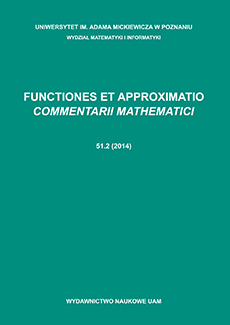Abstract
Let $q$ be a prime. We give an elementary proof of the fact that for any $k\in\mathbb{N}$, the proportion of $k$-element subsets of $\mathbb{Z}$ that contain a $q^{\text{th}}$ power modulo almost every prime, is zero. This result holds regardless of whether the proportion is measured additively or multiplicatively. More specifically, the number of $k$-element subsets of $[-N, N]\cap\mathbb{Z}$ that contain a $q^{\text{th}}$ power modulo almost every prime is no larger than $a_{q,k} N^{k-(1-\frac{1}{q})}$, for some positive constant $a_{q,k}$. Furthermore, the number of $k$-element subsets of $\{\pm p_{1}^{e_{1}} p_{2}^{e_{2}} \cdots p_N^{e_N} : 0 \leq e_{1}, e_{2}, \ldots, e_N\leq N\}$ that contain a $q^{\text{th}}$ power modulo almost every prime is no larger than $m_{q,k} \frac{N^{Nk}}{q^N}$ for some positive constant $m_{q,k}$.
Citation
Bhawesh Mishra. "Almost no finite subset of integers containsa $q^{\text{th}}$ power modulo almost every prime." Funct. Approx. Comment. Math. 70 (1) 129 - 141, March 2024. https://doi.org/10.7169/facm/2122
Information





